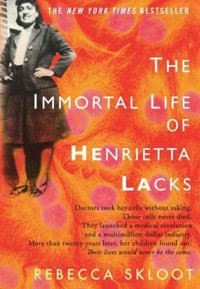The Immortal Life of Henrietta Lacks by Rebecca Skloot | Book Review
 The Immortal Life of Henrietta Lacks by Rebecca Skloot
The Immortal Life of Henrietta Lacks by Rebecca Skloot Genres: Biography, Illness, Medicine, Science
Original Publication Date: 2010
Source: I purchased this book
Goodreads
Find the Author: Website, Facebook, Goodreads, Amazon, Instagram

Her name was Henrietta Lacks, but scientists know her as HeLa. She was a poor Southern tobacco farmer who worked the same land as her slave ancestors, yet her cells—taken without her knowledge—became one of the most important tools in medicine: The first “immortal” human cells grown in culture, which are still alive today, though she has been dead for more than sixty years. HeLa cells were vital for developing the polio vaccine; uncovered secrets of cancer, viruses, and the atom bomb’s effects; helped lead to important advances like in vitro fertilization, cloning, and gene mapping; and have been bought and sold by the billions. Yet Henrietta Lacks remains virtually unknown, buried in an unmarked grave.
Henrietta Lacks was a poor African-American woman who died in 1951 at the age of 31 from cervical cancer. She was treated at Johns Hopkins Hospital in Baltimore, where it was discovered that she had an amazingly aggressive tumor and was in agonizing pain.
Table of Contents
Henrietta Lacks Was Dying of Cancer
While she lay dying, some of her cells, both healthy and diseased, were extracted from her for further use in research. This was done without her knowledge or permission, or the knowledge of her family.
This was actually a common procedure at the time. At the time, permission was not required.
Cells from other patients had not worked. Most cells will divide a certain number of times and then die.
Her Cells Were Used For Medical Research – Without Her Knowledge
But for some reason, Henrietta’s cells were amazingly vital and survived. Her cells were dubbed “HeLa”. HeLa cells were the first human cell line to prove successful in vitro, in test tubes or Petri dishes, which has had a profound impact on medical research.
For example, Jonas Salk used HeLa cells to test the first polio vaccine. They have also been used in cancer and AIDS research.
HeLa cells were dubbed “immortal” because they could be divided an infinite number of times. They still exist, in various forms, today.
Henrietta’s family knew nothing about the HeLa cells until many years later. Here is where the story gets even more complicated: the original doctor, George Gey, seems to have had no bad motives.
Gey was completely dedicated to medicine and simply wanted the cells for further research. Gey freely donated the cells to other researchers.
However, it was other companies that obtained HeLa cells made money off of products invented because of the cells.
Henrietta was forgotten or unknown to most scientists and researchers. While some corporations made millions, Henrietta’s family, while proud that her cells have helped countless others have remained poor.
The whole idea of medical ethics is enormously complicated. Was racism involved? Was it because Henrietta was poor and black?
Or was it simply in the interest of science and medicine?
What about the companies that benefitted financially from the research? Are cells still harvested today without permission? The answers are not as simple as they may seem.
Final Analysis
This book studies medical ethics, family history, racism, and poverty.
Author Rebecca Skloot does a fine job in researching and setting forth her arguments. This book was a real labor of love and she is passionately devoted to the subject.
Skloot became so involved with the family that she set up a foundation to help them: The Henrietta Lacks Foundation.
If I have any quibbles about this book, it is that it is a bit too long. I did make my husband read the book. It is not at all the sort of book he usually reads, but he is a scientist and he found it fascinating.
I also highly recommend this book. It is not light reading, but it is undeniably intriguing and important.
Henrietta’s cells have helped many scientists and researchers develop new ways of dealing with the disease.
In this way, Henrietta Lacks has become truly immortal.
If you enjoyed this review, please read my post on Brain On Fire: My Month of Madness and I Never Promised You a Rose Garden.
Thank you for reading The Literary Lioness!




